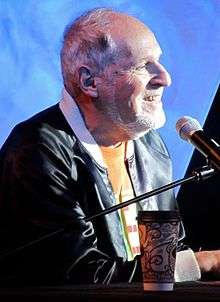Herbert Deutsch
Herbert A. Deutsch (born February, 1932) is an American composer, inventor, and educator. Currently professor emeritus of electronic music and composition at Hofstra University, he is best known for co-inventing the Moog Synthesizer with Bob Moog in 1964.
Herbert A. Deutsch | |
|---|---|
 Herb Deutsch speaks at MoogFest 2011 | |
| Born | Baldwin, Nassau County, New York |
| Nationality | American |
| Occupation | Composer, Educator, Electronic music pioneer |
Early life and education
Deutsch was born in 1932 in Baldwin, Nassau County, New York. At the age of four, he first realized he had a musical gift. Through his childhood, he studied music and began composing at a young age. Deutsch attended the Manhattan School of Music, earning his B.A. and M.A. there.
Work with Moog
Deutsch had assembled a theremin based on Moog's design in 1962 and in November, 1963 he introduced himself to Moog at a music-education conference in Rochester, NY.[1] In 1964 Moog and Deutsch started investigating the possibilities of a new instrument to aid composers.[2] Deutsch has been credited with the keyboard interface of the Moog.[2] He composed the first piece ever for the Moog ("Jazz Images - A Worksong and Blues"[1]) and performed early Moog concerts at The Town Hall and The Museum of Modern Art in New York (1969's Jazz in the Garden [3]).[4] The prototype Moog synthesizer, developed by Bob Moog and Herbert Deutsch in 1964, is part of the collections of The Henry Ford museum.[5]
Career
Deutsch is a dedicated educator. In the early 1970s he taught at St. Agnes High School in Rockville Centre, New York. He has taught at Hofstra University for over 50 years and was twice the chair of the music department. Deutsch co-founded the Long Island Composers Alliance in 1972, and works with music foundation NYSSMA. In 1994 he proposed its Electronic Music Composition Showcase.[6]
References
- moogarchives.com, Interview with Herbert A. Deutsch
- Karin Lipson (June 17, 2007). "Making Musical History". The New York Times.
- Stanleigh review
- moogmusic.com, Herb Deutsch presents at the International Conference on the Arts and Humanities (2007 Conference January 12-15)
- "Robert Moog's First Prototype Synthesizer, 1964-1965 - The Henry Ford". www.thehenryford.org. Retrieved 2016-05-09.
- "The NYSSMA Electronic Music Composition Showcase". NYSSMA. New York State School Music Association. Retrieved 6 December 2016.
External links
- Long Island Composer's Alliance
- Herb Deutsch - Hofstra Faculty Professor Emeritus
- New York State School Music Association Website
- NYSSMA Electronic Music Composition Showcase Website
- Video of Herb Deutsch on Mini Moog Synthesizer plus a surprise! on YouTube
- Herbert Deutsch Interview - NAMM Oral History Library (2005)